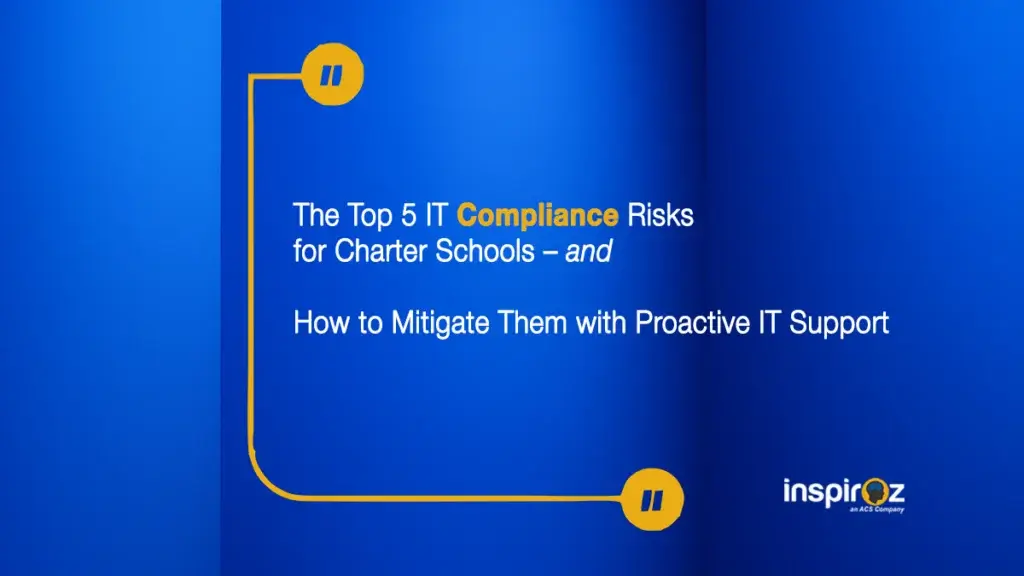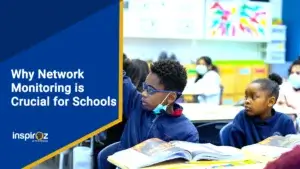Digital transformation brings tremendous advantages, it also exposes schools to significant IT compliance risks. From student data privacy to cybersecurity threats, these challenges can jeopardize not only academic outcomes but also legal and financial stability.
To remain compliant with federal and state regulations, charter schools must integrate strong IT support systems and processes.
1. Student Data Privacy Violations (FERPA & COPPA Non-Compliance)
The Risk:
Student data privacy is a cornerstone of IT compliance in K-12 schools. Charter schools are required to protect sensitive student information under federal laws such as:
- FERPA (Family Educational Rights and Privacy Act) – Protects students’ education records.
- COPPA (Children’s Online Privacy Protection Act) – Governs the collection of data from children under 13.
Failure to comply with these regulations can lead to investigations, financial penalties, loss of federal funding, and erosion of parent and community trust.
Real-World Consequences:
In December 2024, PowerSchool, a widely used Student Information System (SIS), experienced a significant data breach. This incident exposed personal information—including names, addresses, Social Security numbers, and medical data—of approximately 800,000 Texans. The breach underscored the vulnerabilities in third-party educational platforms and the critical importance of ensuring vendor compliance with data protection regulations like FERPA and COPPA.
Solution:
- Robust IT support strategies can help educational institutions mitigate this risk by:
- Implementing role-based access controls (RBAC) to limit who can access student records.
- Encrypting student data at rest and in transit.
- Regularly conducting FERPA and COPPA compliance audits.
- Using verified EdTech platforms that are FERPA-compliant.
- Creating and enforcing acceptable use policies for students and staff.
2. Cybersecurity Threats and Ransomware Attacks
The Risk:
Charter schools are increasingly targeted by cybercriminals due to their limited IT budgets and valuable data stores. The K-12 Cybersecurity Act passed in 2021 highlights the growing risk of ransomware, phishing, and malware attacks in schools.
These incidents can result in data breaches, prolonged downtime, and major disruptions to teaching and learning.
Real-World Consequences:
In 2023, the education sector witnessed a record-breaking 121 ransomware attacks, a significant increase from 71 incidents in 2022. These attacks led to an average of 12.6 school days lost per incident, disrupting learning and administrative operations. The financial implications were substantial, with average ransom demands reaching $847,000. Such incidents highlight the pressing need for robust cybersecurity measures in K-12 institutions.
Solution:
- Charter schools must build cybersecurity into their IT support strategies with the following actions:
- Implement next-gen firewalls and endpoint detection and response (EDR) tools.
- Conduct annual risk assessments and vulnerability scans.
- Use multi-factor authentication (MFA) for all user logins.
- Provide cybersecurity training for teachers, students, and administrative staff.
- Maintain cyber insurance policies that cover data breach response.
Partnering with a Managed IT Service Provider (MSP) experienced in school cybersecurity can strengthen defenses while remaining cost-effective.
3. Insufficient Data Backup and Disaster Recovery Planning
The Risk:
Many charter schools fail to develop comprehensive disaster recovery and backup strategies. Whether due to hardware failure, natural disasters, or cyberattacks, data loss can be catastrophic for K-12 educational institutions.
Without a reliable data continuity plan, schools risk losing academic records, financial data, IEP documents, and compliance records—all of which are essential for daily operations and long-term reporting.
Real-World Consequences:
An audit of Eugenio Maria de Hostos Charter School revealed a lack of a comprehensive disaster recovery plan and inadequate IT policies. The absence of such protocols placed the school’s data at significant risk, potentially leading to loss or misuse of critical information. Without proper backup and recovery strategies, schools face challenges in resuming operations after data loss incidents.
Solution:
Effective IT support plans must include:
- Daily automated backups stored in secure cloud environments.
- A disaster recovery plan (DRP) that outlines roles, responsibilities, and timelines.
- Regular testing of backup systems to ensure data integrity.
- Versioning and rollback features for file recovery in case of accidental deletion or corruption.
Using a hybrid backup solution—both onsite and cloud-based—ensures maximum resilience.
4. Third-Party Vendor Non-Compliance and Oversight
The Risk:
Charter schools frequently use third-party vendors for learning management systems (LMS), student information systems (SIS), and administrative software. However, outsourcing doesn’t absolve schools of compliance responsibility. If a vendor fails to comply with federal or state mandates, the educational institution remains liable.
Real-World Consequences:
The PowerSchool data breach not only affected students and staff but also raised concerns about third-party vendor compliance. Schools relying on external platforms for data management must ensure these vendors adhere to stringent data protection standards. Failure to do so can result in breaches that compromise sensitive information and violate federal regulations.
Solution:
Charter schools should implement strict vendor vetting and oversight processes as part of their IT support strategy:
- Include compliance clauses in vendor contracts, especially regarding FERPA, COPPA, HIPAA, and state-specific laws.
- Request SOC 2 or ISO 27001 certifications from vendors handling sensitive data.
- Conduct annual vendor audits or security questionnaires.
- Maintain a vendor risk register to monitor critical tools and partners.
- Work with MSPs to consolidate and monitor third-party solutions under one compliance framework.
5. Failure to Maintain IT Asset and Software License Compliance
The Risk:
Improper asset management and software licensing can result in legal penalties, audit failures, and unplanned expenses. Many K-12 schools struggle to track device usage, software licensing, and end-of-life hardware, especially in BYOD or 1:1 device programs.
This leads to unauthorized software installations, expired licenses, or violations of terms of service—exposing the institution to both security and compliance issues.
Real-World Consequences:
An audit of True North Rochester Preparatory Charter School highlighted severe penalties associated with software licensing violations. The school faced potential legal liabilities, including attorney fees and mandated IT audits, due to the use of unlicensed software. Such oversights can lead to significant financial and reputational damage for educational institutions.
Solution:
A well-organized IT support team should enforce:
- IT asset management systems (ITAM) to track devices, usage, and maintenance.
- Regular software license audits and centralized procurement.
- Automated patch management tools to ensure compliance and security.
- Policies that restrict software installations to approved and licensed applications only.
- End-of-life policies for outdated or unsupported devices.
Modern device management solutions such as Microsoft Intune or Google Admin Console can simplify license tracking and policy enforcement for schools using cloud-based ecosystems.
Conclusion: Building a Culture of Compliance Through Proactive IT Support
Charter schools and K-12 educational institutions are held to high standards when it comes to protecting data, managing technology, and ensuring operational continuity.
In an era where digital learning and cyber risks are intertwined, the importance of proactive IT support cannot be overstated.
By prioritizing the top five compliance risks—data privacy, cybersecurity, backup readiness, vendor oversight, and software compliance—charter schools can avoid costly penalties, protect their students and staff, and focus on delivering quality education.
Investing in strategic IT support is not just about technology—it’s about accountability, safety, and future-readiness. Whether through in-house teams or trusted MSP partners, educational institutions must treat IT compliance as a long-term commitment, not a one-time fix.







